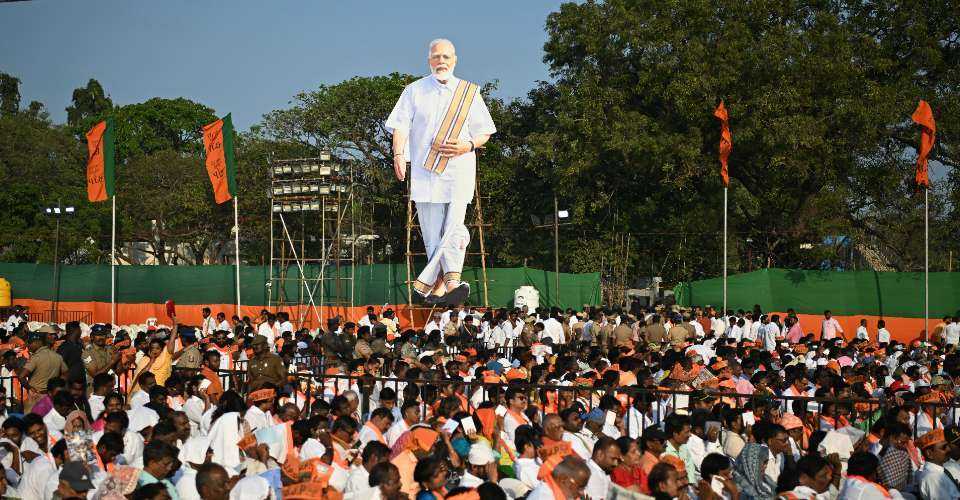
By Nirendra Dev
Social and religious divisions are crystal clear in the politics of India’s ruling Bharatiya Janata Party (BJP). In the first list of 195 candidates released by the party’s election committee, where Prime Minister Narendra Modi is the chief decision maker, there are only two names from religious minorities — one Muslim and one Christian.
Both minority candidates in the list released on March 2 will be contesting from the communist-ruled southern Kerala state, where the pro-Hindu BJP hardly has any presence.
Anil Antony, a Catholic will be the BJP’s candidate from the Pathanamthitta Lok Sabha constituency with nearly 40 percent Christian voters. The pro-Hindu party is banking on them to wrest the seat from rival Congress, whose Anto Antony Punnathaniyil has represented it in India’s parliament for three terms since 2009.
Anil is the son of veteran Congress leader and former defense minister A. K. Antony, an octogenarian and self-professed agnostic. The father has often advocated the philosophy of Kerala’s foremost social reformer Sree Narayana Guru — a champion of equality and justice.
However, while it has propelled a Catholic in the southern state, the BJP has dropped John Barla, a tribal Catholic, who is serving as a junior minister for minority affairs in the present Modi cabinet.
Barla was elected in 2019 from Alipurduar constituency in West Bengal and has been championing the rights of tea garden workers in West Bengal and Assam states in eastern India.
Barla’s exclusion from the list of candidates came as a surprise to many in Delhi’s political circles as he was Modi’s go-to man in times of crisis, especially amid rising attacks on Christians and their institutions over the past few years.
It was often left to Barla to meet and convince leaders of the Christian community, which forms 2.3 percent of India’s 1.4 billion people, that they were “safe” under the government led by Modi and that the “campaign” regarding attacks on minorities was wrong.
The BJP, which claims to be the “biggest political party in the world” hasn’t had a single Muslim lawmaker in parliament for the past few years. Its last Muslim parliamentarian was Shahnawaz Hussain, who won in the Bhagalpur constituency in northern Bihar state in the 2009 national election.
In the forthcoming election, Abdul Salam, a former vice chancellor of Calicut University in Kerala, will be the BJP’s candidate in the Malappuram parliamentary constituency, which is known as a Muslim stronghold.
The current elected representative from Malappuram is Abdussamad Samadani from the Indian Union Muslim League, a political party primarily based in Kerala.
Salam joined the BJP in 2019 and had unsuccessfully contested the state assembly election in 2021. He will have an uphill task as the constituency has been a Muslim League bastion for decades.
The BJP’s critics often accuse it of attempting to divide communities and consolidate Hindu votes for Modi who is eying a third consecutive term as prime minister of the world’s largest democracy.
French scholar Christophe Jaffrelot recently claimed that Muslim representation in India’s civil sector — namely police and other government jobs — was far lower in proportion to their numbers (14.5 percent of India’s total population).
Moreover, Muslim representation has fallen sharply in parliament and state assemblies under BJP rule.
The Modi cabinet at present does not have a single Muslim member.
However, this doesn’t affect Modi and his BJP’s electoral prospects. Far from it, even the prime minister’s staunchest critics admit that his BJP has a clear edge in the coming election against a rag-tag opposition alliance led by the Congress, which swears by the secular-socialist principles of the Indian Constitution.
“The BJP has a distinct advantage. The only thing that could go against it is overconfidence and perhaps internal sabotage,” says political analyst Vidyarthi Kumar.
He pointed to how an overconfident BJP suffered a humiliating defeat at the hands of Congress in 2004.
But Modi isn’t taking any chances. He will seek a third term as an MP from Varanasi or Benaras, an ancient but congested temple town in northern Uttar Pradesh.
Modi’s pro-Hindu politics and policies are his biggest qualification to represent the constituency, which is one of the top pilgrimage centers for Hindus across the world.
The prime minister, since his first election win there, has transformed Varanasi into a popular tourist hub, which attracted around 84.2 million visitors between January and September 2023.
“Everyone talks about the Hindutva politics of BJP. I do not dispute that. But in Varanasi, Modi has caught the imagination of the local electorate by taking up development work,” says Tushar Bhadra, a political observer from Varanasi.
Congress leader Rahul Gandhi, who represents the Wayanad constituency in Kerala, may face an uphill task holding on to it with the Communist Party of India announcing it will be fielding a woman candidate, Annie Raja, in the constituency.
India’s communists are part of Gandhi’s India alliance, but in Kerala, they have been staunch opponents of the Congress since independence.
Gandhi lost to a BJP woman candidate, Smriti Irani, from his pocket borough Amethi in Uttar Pradesh in 2019. Anticipating defeat, he had also contested the Wayanad seat.
The BJP knows that if he is forced to seek refuge again in some other constituency it will be a major embarrassment for Modi’s challenger-in-chief.
At the moment, in the run-up to the Indian election, it looks like a cakewalk for Prime Minister Modi.



0 Comments
LEAVE A COMMENT
Your email address will not be published